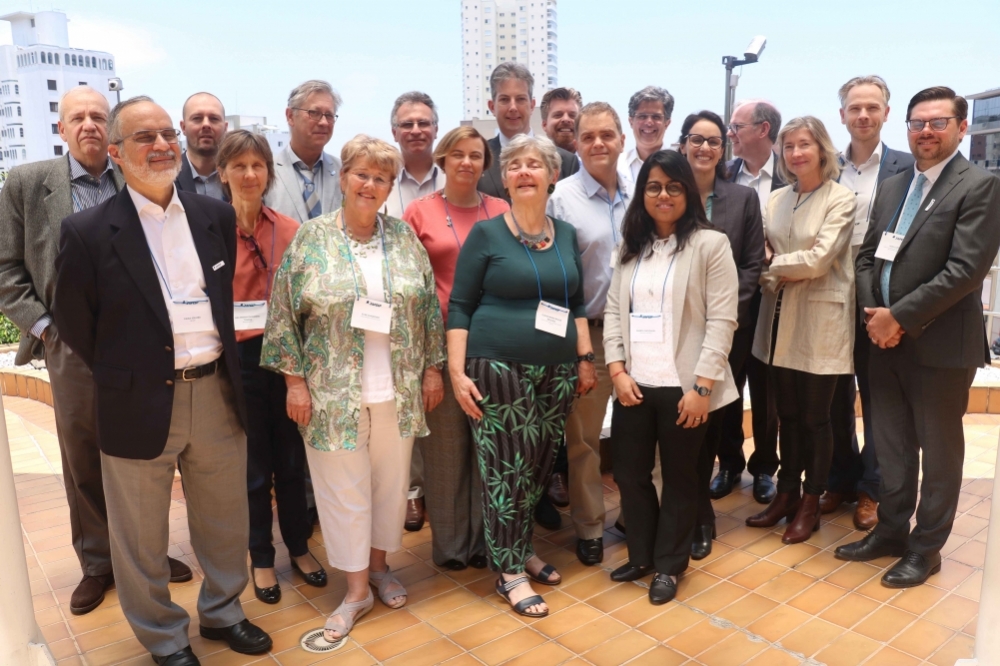

The meeting was organized by the Consulate General of the Kingdom of the Netherlands in São Paulo and FAPESP with the aim of fostering collaborative research (photo: Felipe Maeda / Agência FAPESP)
The meeting was organized by the Consulate General of the Kingdom of the Netherlands in São Paulo and FAPESP with the aim of fostering collaborative research.
The meeting was organized by the Consulate General of the Kingdom of the Netherlands in São Paulo and FAPESP with the aim of fostering collaborative research.

The meeting was organized by the Consulate General of the Kingdom of the Netherlands in São Paulo and FAPESP with the aim of fostering collaborative research (photo: Felipe Maeda / Agência FAPESP)
By José Tadeu Arantes | Agência FAPESP – Life sciences and healthcare produce a massive amount of data every day, in the form of patients’ clinical records, laboratory tests, diagnostic images and hospital services, not to mention studies of specific diseases, large-scale epidemiological surveys and research in “omics” (genomics, proteomics, metabolomics, etc.). Every day, the amounts of available data continue to grow, thanks to the development and commercialization of smaller portable sensors that monitor vital signs and identify disease-marking molecules.
The main challenge is converting quantity into quality – that is, turning this amorphous mass of data into an integrated and useful system of information and knowledge. Hence, the convergence of big data and life sciences constitutes one of the most promising fields of research today.
This challenge and opportunity was the motivation for Big Data in Life Sciences & Health – Brazil and the Netherlands, a workshop hosted by the Consulate General of the Kingdom of the Netherlands in São Paulo and FAPESP. It took place at FAPESP’s headquarters on November 25, 2019 and was attended by researchers affiliated with institutions in the Netherlands and São Paulo State.
The meeting was opened by Petra Smits, Netherlands Consul for Science, Technology and Innovation in Brazil; Hernan Chaimovich, representing FAPESP’s Adjunct Panel on Special Programs and Research Collaboration; and Claudia Bauzer Medeiros, a professor at the University of Campinas’s Computer Science Institute (IC-UNICAMP) and a member of the steering committee for the FAPESP Research Program on eScience and Data Science.
“The aim of the workshop was to bring together Dutch experts on big data in health and researchers in São Paulo State to share information about major challenges and ongoing projects, exchange experiences, and explore opportunities for collaboration,” Smits told Agência FAPESP.
According to Medeiros, the two areas – health and life sciences – accounted for approximately 39% of the total funds disbursed by FAPESP to support research in 2017, which corresponded to US$530 million.
“The research projects funded can be seen as a combination of three factors: data types and sources, such as clinical exams and diagnostic images; computational aspects associated with big data, including visualization, algorithms, storage and interoperability; and health and life sciences, from the macro level of epidemiology to the level of ‘omics’ via hospital services, clinical decision support systems and issues associated with specific diseases,” Medeiros told Agência FAPESP.
Health is a major focus for the Netherlands. “According to international rankings, our country has one of the foremost healthcare systems in Europe,” Smits said, adding that health and life sciences are priorities for collaboration with Brazil. “A recent example of this focus is our bilateral call with FAPESP for research proposals on healthy aging.”
With a population of just over 17 million, the Netherlands has a national health system that has been assessed as the best in Europe. Health insurance is mandatory and covers 99% of the population. According to data from the World Health Organization (WHO), Dutch investment in the health sector corresponds to 10.7% of GDP, and more than 80% of spending in the sector is publicly funded.
“The Department of Innovation at the Consulate General of the Kingdom of the Netherlands in São Paulo organized this mission with Dutch experts to meet with the same kind of experts in São Paulo State and start a dialogue with the aim of fostering collaboration. The first step was to identify gaps and potential joint projects. Funding for a possible call for proposals was left to future discussions,” said Bruna Cersózimo Arenque Musa, coordinator of FAPESP’s scientific programs in biology, agronomy and veterinary research, and a member of the organizing committee for the workshop.
Musa recalled that FAPESP and the Netherlands Organization for Scientific Research (NWO) have a history of discussing cooperation. “What’s been established so far is that partnerships between the two organizations should focus in the coming years on three major areas: health; the green economy, including bioeconomics and biodiversity; and technology,” she said. “The workshop focused mainly on health and technology, so these preliminary discussions are expected to provide a basis for future calls for proposals.”
The 20-odd Brazilian and Dutch researchers who took part in the meeting presented their research and discussed possible directions for cooperation. According to Medeiros, the event enabled the participants to identify several possible lines of joint research on cutting-edge topics in the field of digital health. “We saw excellent examples of what we call data-driven research, a typical feature of eScience,” she said.
Republish
The Agency FAPESP licenses news via Creative Commons (CC-BY-NC-ND) so that they can be republished free of charge and in a simple way by other digital or printed vehicles. Agência FAPESP must be credited as the source of the content being republished and the name of the reporter (if any) must be attributed. Using the HMTL button below allows compliance with these rules, detailed in Digital Republishing Policy FAPESP.





